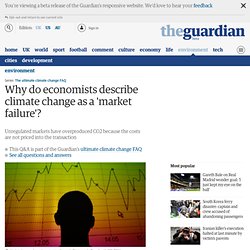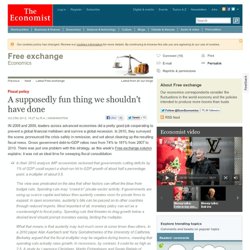

Macroecon MOOC Extra reading. There's more to good policy than increasing GDP. Economists are regularly criticised for worrying about gross domestic product (GDP) and similar measures. The classic statement of the case was by Robert F Kennedy : “Too much and too long, we seem to have surrendered community excellence and community values in the mere accumulation of material things.
Our gross national product … if we should judge America by that – counts air pollution and cigarette advertising, and ambulances to clear our highways of carnage. It counts special locks for our doors and the jails for those who break them. Why do economists describe climate change as a 'market failure'? When free markets do not maximise society's welfare, they are said to 'fail' and policy intervention may be needed to correct them.

Many economists have described climate change as an example of a market failure – though in fact a number of distinct market failures have been identified. The core one is the so-called 'greenhouse-gas externality'. Greenhouse gas emissions are a side-effect of economically valuable activities. Most of the impacts of emissions do not fall on those conducting the activities – instead they fall on future generations or people living in developing countries, for example – so those responsible for the emissions do not pay the cost.
The adverse effects of greenhouse gases are therefore 'external' to the market, which means there is usually only an ethical – rather than an economic – incentive for businesses and consumers to reduce their emissions. The ultimate climate change FAQ Related questions• What is the economic cost of climate change? Fiscal policy: A supposedly fun thing we shouldn't have done. IN 2008 and 2009, leaders across advanced economies did a pretty good job cooperating to prevent a global financial meltdown and survive a global recession.

In 2010, they surveyed the scene, pronounced the crisis safely in remission, and set about cleaning up the resulting fiscal mess. Gross government debt-to-GDP ratios rose from 74% to 101% from 2007 to 2010. There was just one problem with this strategy, as this week's Free exchange column explains: it was not an ideal time for sweeping fiscal consolidation: In their 2010 analysis IMF economists reckoned that governments cutting deficits by 1% of GDP could expect a short-run hit to GDP growth of about half a percentage point: a multiplier of about 0.5. This view was predicated on the idea that other factors can offset the blow from budget cuts. EU revised budget deficit data paints grim picture of Greece. Athens’ budget deficit for 2010 was upwardly revised to 10.5 percent of GDP from the previous estimate of 9.6 percent (and well above the 8 percent target that the Greek government agreed to in exchange for the huge 110-billion-euro bailout it received last year from the EU/IMF).
The level of debt in Greece was increased to 142.8 percent of GDP from the previous 127.1 percent figure. These numbers will likely distress both EU officials and the Greek government, which has imposed a series of harsh and unpopular austerity programs –including severe spending cuts and tax increases -- designed to bring down the debt. (These measures were at least in bringing down the budget deficit from a whopping 15.4 percent of GDP in 2009, but not by enough). The bond markets hammered Greek sovereigns after the data was released, suggesting that investors believe the country’s debts are out of control and that bondholders will likely suffer huge losses when the existing bailout expires in 2013. Economics Student Society of Australia (ESSA) China has certainly grown exceptionally over the past decade. Can the Middle Kingdom escape what some anticipate to be a middling future? Recently China’s president Xi Jinping was quoted in saying that China’s GDP growth will be subdued in the foreseeable future, relative to the rapid growth in the past decade.
China’s official newspaper Xinhua has put the internal target at 7.5% p.a. for 2013 from a 7.8% p.a. actual figure achieved in 2012, and many are undoubtedly aware that this is a 13-year record low. Tablets: the next productivity rocket. Wiki - Optional/Extra Macro Readings. In this course, we will examine the main bodies of economic theory that have been used to guide economists’ and policy makers’ understanding of the macroeconomy. Macroeconomics is a word derived from the Greek prefix “makros”, meaning large. It is the study of economic aggregates, of national and international economies and of the economic management role played by governments and international organisations. The founder of modern macroeconomics, the British economist John Maynard Keynes, famously wrote “The ideas of economists and political philosophers, both when they are right and when they are wrong are more powerful than is commonly understood.
Indeed, the world is ruled by little else. Practical men, who believe themselves to be quite exempt from any intellectual influences, are usually slaves of some defunct economist.” Image source: Nilss Olekalns University of Melbourne 2012.